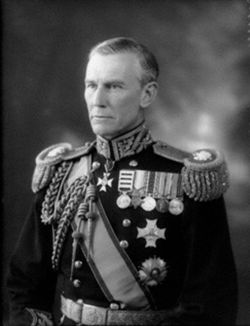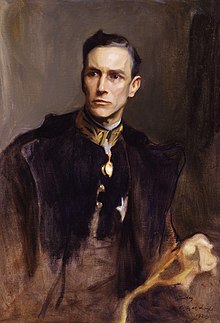View entry
Name: MAFFEY, John Loader KCVO, CSI, CIE, Sir


Nee: later 1st Baron Rugby (1947)
Birth Date: 1 July 1877 Rugby
Death Date: 20 Apr 1969 Lothingland, Suffolk
First Date: 1937
Profession: Entered Indian Civil Service 1899, Political Agent, Khyber 1909-12; Private Sec. to Viceroy 1916-20; Governor-General of the Sudan 1926
Area: Cavelon Estate, Kitale
Married: In Hadlow Down, Sussex 28 Aug 1907 Dorothy Gladys Huggins OBE b. 24 Jan1884 Godstone, d. 1973 Tandridge , Norfolk
Children: Alan Loader (16 Apr 1913-12 Jan 1990); Penelope (Aitken) (2 Dec 1910-7 Feb 2005); Simon Chelmsford (12 Apr 1919-16 Dec 2004)
Book Reference: Hut, Debrett
School: Rugby and Christ Church Oxford
General Information:
FindaGrave: Lady Maffey was the wife (married 18 August 1907) of Sir John Loader Maffey, 1st Baron Rugby, a British civil servant who was appointed Governor-General of the Sudan (31 October 1926-10 January 1934) and later returned to London to a post as Permanent Under-Secretary for the Colonies. During the Second World War he was appointed by Winston Churchill as the first United Kingdom representative to Eire (1939-1949).
A plant collector: Herbarium material collected under the name Lady Maffey was sent to K (1927-1929) from the Sudan.
Specification: Plant collector
Groups collected :Spermatophytes
Organisation(s): K
Countries: Tropical Africa: Sudan
Associate(s):Huggins, D.G. (fl. 1907) (née)
FindaGrave: John Loader Maffey, 1st Baron Rugby GCMG KCB KCVO CSI CIE (1 July 1877 – 20 April 1969) stylized 'Lord Rugby' was a British civil servant and diplomat who was a key figure in Anglo-Irish relations during the Second World War.
Maffey was the younger son of Thomas Maffey, a commercial traveller of Rugby, Warwickshire, and his wife Mary Penelope, daughter of John Loader.
At Winston Churchill's request, he became the first United Kingdom representative to Ireland in 1939. His appointment raised some delicate constitutional issues for the UK insofar, as the Irish government suggested that he be designated a 'Minister', in line with how representatives of foreign governments were titled. The title 'Representative' was agreed with the Irish as a compromise.
Neville Chamberlain remarked that the title would "seem to be well suited to an appointment such as this which is essentially an emergency arrangement intended to meet a temporary but urgent situation". After Maffey took up his appointment as 'Representative', there were reports that the Irish Republican Army might abduct or kill him.
Maffey held the post throughout the war years and until his retirement in 1949. During the war, he was undoubtedly the most important foreign diplomat resident in Dublin, given the complications of Ireland's neutrality policy. As 'British Representative to Eire', Maffey quickly established a good working relationship with Éamon de Valera. De Valera was personally in favour of the survival of democracy but did not necessarily trust the British to look after Ireland's best interests. Maffey was vital in mediating between the 'Warlord' Churchill and 'the Chief' de Valera.
When de Valera was replaced by a coalition, headed by John A. Costello, in 1948, Maffey again established a good working relationship with its members, but he was scathing about the clumsy manner in which the declaration of a Republic was handled: "Mr. Costello has handled the business in a slipshod and amateur fashion".
He encouraged John Betjeman, the press attaché, to establish friendly relations with leading and rising figures in the Dublin literary world like Patrick Kavanagh; Maffey himself suggested the subject for one of Kavanagh's poems.
In his memorandum, "The Irish Question in of 1945"addressed to the State for the Dominions Maffey expressed his view: "To-day, after six years' detachment, Eire is more than ever a foreign country. It is so dominated by the National Catholic Church as to be almost a theocratic State. Gaelic is enforced in order to show that Eire is not one of the English-speaking nations; foreign games are frowned upon, the war censorship has been misapplied for anti-British purposes, anti-British feeling is fostered in school and by Church and State by a system of hereditary enemy indoctrination. There is probably more widespread anti-British sentiment in Eire to-day than ever before." Commenting on a recent attack by Churchill on de Valera, Maffey reported "Nothing helped Mr. de Valera more than Mr. Churchill's personal attack.... The Irish are a very distinct race, and their marked characteristics persist strongly.... There still persist the dark Milesian strain, the tribal vendetta spirit, hatred and blarney, religious fanaticism, swift alternations between cruelty and laughter. A knowledge of the North-West Frontier tribes of India is a good introduction to an understanding of the Irish. They are both very remarkable and in many ways attractive people, with the same mental kinks. We were wise enough not to attempt to bring the Afridis under our direct rule." He continued "Mr. de Valera is not himself a hater of England, as Mr. Frank Aiken, the Finance Minister, is.... There is very little of the Irishman in Mr. de Valera. He is trusted because of his austerity and his cold mathematical approach to Anglo-Irish problems. He understands the narrowness of the Irish mind and does not venture on to broader paths, though he might certainly have led his people out of spiritual bondage in 1941, when America came into the war."
Maffey felt that "we can now talk to Eire on a cold, factual, horse-trading basis, knowing perfectly well that the cards are in our hands." He continued, "It must be admitted that, by ascribing Dominion status to Eire, we placed in unfriendly hands a power to weaken the conception and responsibilities of Dominion status. Eire has none of the attributes of a Dominion. She is a "Scotland " gone wrong, and we cannot afford to let her be completely divorced from the strategic and economic zone of England, Scotland and Wales." Turning to Northern Ireland, Maffey remarked, "Unhappily it is not possible for us to feel satisfied with the state of affairs in Northern Ireland. The Unionist Government are fighting an insidious enemy who is gaining upon them. Their ballot box is not safe over a period against the Catholic birth-rate. The loyalty of the local garrison is not proof against the attractions of a lower income-tax rate in Eire. They are vulnerable to world criticism. The British Government cannot afford to ignore the pronouncement made in November 1944 by the Catholic Archbishop of Westminster, the Most Rev. Dr. Griffin, that there is religious persecution at the present day in Northern Ireland."
In 1947, Maffey was raised to the peerage as Baron Rugby, of Rugby in the County of Warwick.
Lord Rugby m. 28 August 1907 Dorothy Gladys Huggins, daughter of Charles Lang Huggins.They became the parents of three children: Alan, Henry and Penelope.
Their daughter Penelope Aitken {Penelope Loader, Lady Aitken, MBE (2 December 1910 – 7 February 2005), styled The Honorable Lady Aitken and nicknamed 'Pempe'} became a well-known socialite, and was the mother of the former Conservative politician Jonathan Aitken and the actress Maria Aitken and the grandmother of actor Jack Davenport. Lord Rugby died in April 1969, aged 91. Barony succeeded by eldest son Alan Loader Maffey.
